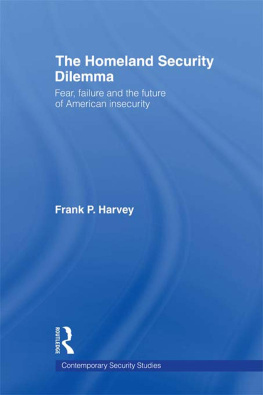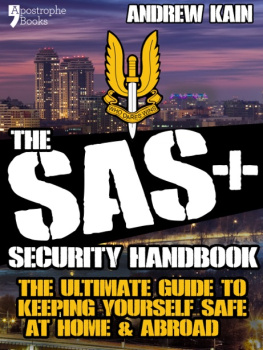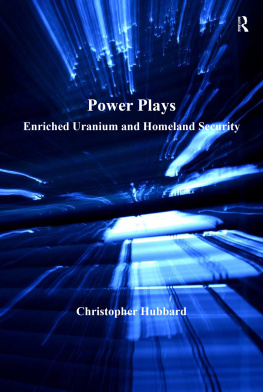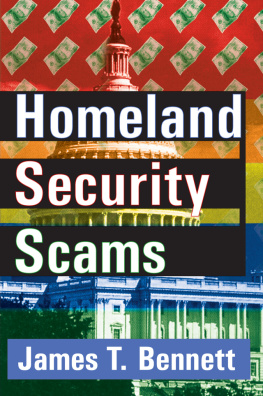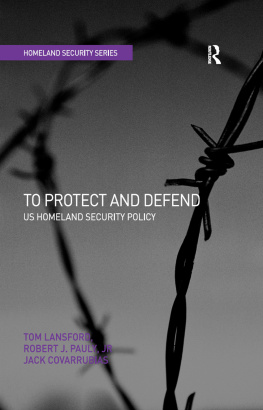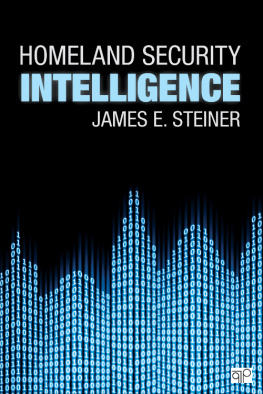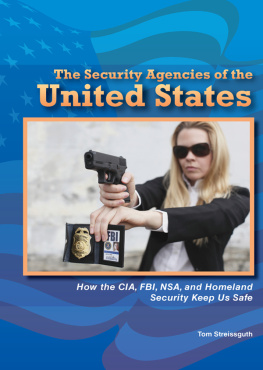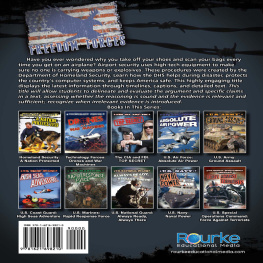Thank you for downloading this Simon & Schuster eBook.
Join our mailing list and get updates on new releases, deals, bonus content and other great books from Simon & Schuster.
C LICK H ERE T O S IGN U P
or visit us online to sign up at
eBookNews.SimonandSchuster.com
We hope you enjoyed reading this Simon & Schuster eBook.
Join our mailing list and get updates on new releases, deals, bonus content and other great books from Simon & Schuster.
C LICK H ERE T O S IGN U P
or visit us online to sign up at
eBookNews.SimonandSchuster.com
CONTENTS

Simon & Schuster
1230 Avenue of the Americas
New York, NY 10020
www.SimonandSchuster.com
Copyright 2016 by Juliette Kayyem
All rights reserved, including the right to reproduce this book or portions thereof in any form whatsoever. For information, address Simon & Schuster Subsidiary Rights Department, 1230 Avenue of the Americas, New York, NY 10020.
First Simon & Schuster hardcover edition April 2016
SIMON & SCHUSTER and colophon are registered trademarks of Simon & Schuster, Inc.
For information about special discounts for bulk purchases, please contact Simon & Schuster Special Sales at 1-866-506-1949 or .
The Simon & Schuster Speakers Bureau can bring authors to your live event. For more information or to book an event, contact the Simon & Schuster Speakers Bureau at 1-866-248-3049 or visit our website at www.simonspeakers.com.
Interior design by Ruth Lee-Mui
Jacket design by Na Kim
Jacket photograph by Kelly Campbell for Simon & Schuster
Library of Congress Cataloging-in-Publication Data is available.
ISBN 978-1-4767-3374-6
ISBN 978-1-4767-3377-7 (ebook)
To David,
my hearts home
To Cecilia, Leo, and Jeremiah,
my homes heartbeat
We oughtnt pray for what weve never known
And humanity has never known
Unbroken peace
Unmixed blessing
No.
Better to pray for...
The will to see and touch
The power to do good and make new.
Rabbi Stanley F. Chyet, as found in Mishkan Tfilah: A Reform Siddur
PROLOGUE
I STARED AT THE TRAFFIC LIGHT . Red. The radio was offnone of those Top 40 tunes I blasted even when the kids had left the car. Instead, I listened to the low thrum of the motor, the echoes of sirens, the lub-dub of my heart. It was nearing midnight on Thursday, April 18, 2013, the rhythm of a surreal week in Boston moving closer to a weekend that promised no relief: multiple bombings on Monday; police, FBI agents, reporters, and news teams a mile from our house for days; a nation descended into grief and fear; a global investigation of two men who turned out to be our neighbors.
My kidsCecilia, Leo, and Jeremiahwere home. Their April-break vacation had been canceled, because Moms job was... what, exactly? I was no longer in government, no longer the statesthis Commonwealth of Massachusettsshomeland security advisor, no longer a senior appointee in the Obama administration at the Department of Homeland Security. I had no actual responsibility except, after answering a call from a friend at CNN (Is this Juliette? Where are you? Can you get to Commonwealth Avenue?), to explain to others what I knew, since those bombs went off at the very marathon I had worked so hard to secure years before.
As a homeland security and counterterrorism expert, I have learned to compartmentalize the despair that follows disaster. My role isnt to feel too muchthough I so often dobut to plan, and prepare, and respond to whatever mayhem, as it always does, has arrived.
But thisthis act of terrorhit close to home. My son, playing outside that day, heard the explosion. Later that night, helicopters hovering over our house kept us awake, as if we could even think of sleep. I still had a panicked voice message on my phone from a friend who crossed the finish line two minutes before the bombs went off, who then spent another endless twenty-three minutes searching for her husband and two children.
That Thursday, I spent all day on the air. At five p.m., the FBI released images of the men they suspected were the terrorists, but they had no more evidence and asked the public for help with identification. Who were they? Someone must know.
It turned out that the Tsarnaev brothers were not strangers to this city. They lived down the street from us. They had attended my kids school. They visited a mosque that we passed every day. Had we seen them at the market once or twice? Those brothers fit so easily into our eclectic Cambridge neighborhoodas did we, as did so many others from around the globe seeking the acceptance of this progressive enclave in the shadows of Harvard and MIT.
But no one knew any of this that Thursday night. So I left the makeshift CNN bureau near the marathon finish line a few hours after the FBI made their request. I retrieved my car from the hotel where every newscaster had set upand where groupies came to take photos of Anderson Cooper or Chris Cuomoand drove home toward Cambridge. It was then, just a hundred feet from my highway exit, on an almost empty road, that I could feelbefore I heardthe rush of police cars come up on me from behind: one, two, three, then maybe forty cop cars passing me and driving toward Watertown. Something was happening. I pulled over, not needing instruction, as I watched themone after another after anotherhead somewhere down the road. Then total silence again, like an elephant stampede that leaves nothing in its wake. I waited by the side of the road, hoping for the all clearthe public safety lingo that had become part of my lifebut none ever came.
I just waited, at a complete standstill on the highway. I could just as easily have been parked. My cell phone rang. It was David, my husband, calling.
I imagined David was pacing in the downstairs kitchen of our home. I couldnt help but wonder if the kids could sleep through all the noise. At ages eleven, nine, and seven, Cecilia, Leo, and Jeremiah were no longer climbing into our bed when they had bad dreams, but this had to affect them, I knew. It certainly affected every adult. David, worried, wanted to know when I was getting home. Now seemed like a pretty good time, I thought.
I started the car, inched slowly toward the exit and through the tollbooth, and waited for the light at the end of the ramp to turn green. My cell phone rang again. I saw the familiar 404 area code on my screen: an Atlanta number. Can you come back? my handlerevery profession has its own code wordsfrom CNN asked, explaining they were setting up to go live on air again. A massive search appeared to be underway, she said with a hint of excitement about what was about to unfold. I didnt feel any of her adrenaline rush; I had witnessed the beginning of the chase here on the highway, and was too tired from all that the brothers had unleashed in such proximity to my home. Producers wanted me in the makeshift studio in full expert mode, ready to discuss the lessons I had learned from my career in counterterrorism and disaster response, a career that began well before September 11, 2001.
So I was at a stoplight, but also a crossroads. Go straight and I would arrive home. Turn right onto Storrow Drive and I would return to CNN, back downtown, where I would analyze and assess the unfolding response to yet another crisis in our homeland. The scenario was disturbingly familiar.
The light turned green, and the way forward was obvious. The homeland could wait.
Next page

